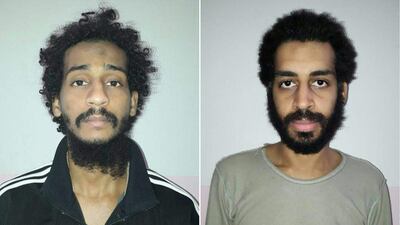Two alleged members of an ISIS assassination squad, known as "The Beatles", have appeared in a US court by videolink after being flown to the US from Iraq to face charges of conspiring to murder four western hostages.
El Shafee Elsheikh, 32, and Alexanda Kotey, 36, are accused of being two of the four members of the brutal terrorist cell who were named after the English band because of their accents.
They were taken to the US by FBI agents on Wednesday and the charges against them were read during an initial appearance in a federal court in Alexandria.
Wearing prison uniforms, handcuffs and face masks, they appeared by videolink from an undisclosed location in Virginia where they are being held.
They face eight charges, each of which carries a life sentence but not the death penalty, under a deal struck with the UK, which supplied evidence against the men.
The two, who have been stripped of their UK citizenship, deny the charges.
"Our message to other terrorists around the world is this – if you harm Americans, you will face American arms on the battlefield or American law in our courtrooms," Attorney General Bill Barr said.
"Either way, you will be pursued to the ends of the Earth until justice is done."
The charges are a milestone in a long effort by US authorities to bring to justice members of the group known for beheadings and barbaric treatment.
Their victims included journalists, US and UK aid workers and other hostages in Syria.
ISIS terrorists seized citizens from the UK, Denmark, Germany, Italy, France, Spain, New Zealand and Russia.
Elsheikh and Kotey's arrival sets the stage for the most sensational terrorism trial since the 2014 criminal case against the ringleader of a deadly attack on the US mission in Benghazi, Libya.
Videos of the killings, released online in ISIS propaganda, showed prisoners in orange jumpsuits on their knees beside captors dressed in black.
Kotey and Elsheikh are also accused of involvement in mock executions, shocking the hostages with Tasers and forcing captives to fight each other.
Relatives of four of the slain hostages praised the Justice Department for transferring the men to the US for trial.
“Now our families can pursue accountability for these crimes against our children in a US court,” the families said.
The two men have been held since October 2019 in American military custody in Iraq after being captured in Syria a year earlier by the US-backed Syrian Democratic Forces.
The Justice Department has long wanted to put them on trial, but was hampered by a dispute about whether Britain, which does not have the death penalty, would share evidence that could be used in a capital punishment prosecution.
Attorney General William Barr broke the diplomatic standoff this year when he promised the men would not face a death sentence.
That prompted British authorities to share evidence that US prosecutors considered crucial for obtaining convictions.
Benjamin Friedman, policy director at the Defence Priorities think tank, welcomed the work of the two governments to bring the men to justice.
"The case of the so-called Beatles is an example of effective counter-terrorism," Mr Friedman said.
"The men were captured by local allies, Kurdish-led forces who benefitted from US support, and then transferred to US custody.
"Their trial is a result of a diplomatic deal with the UK. They seem very likely to get what they deserve through the courts."
While in detention, the two men admitted they helped to collect email addresses from US aid worker Kayla Mueller, which could be used to send out ransom demands.
Ms Mueller was killed in 2015 after 18 months in ISIS captivity.
The State Department declared the two men to be specially designated global terrorists in 2017.
It accused them of holding captive and beheading about two dozen hostages, including American journalists James Foley and Steven Sotloff, and aid worker Peter Kassig.
"These charges are the product of many years of hard work in pursuit of justice for our citizens slain by ISIS," Mr Barr said.
"Although we cannot bring them back, we can and will seek justice for them, their families and for all Americans."
Elsheikh “was said to have earned a reputation for waterboarding, mock executions, and crucifixions while serving as an ISIS jailer," Mr Barr said.
The State Department said Kotey was a recruiter and probably "engaged in the group’s executions and exceptionally cruel torture methods, including electronic shock and waterboarding”.
Two other members of the Beatles included Mohammed Emwazi, known as “Jihadi John,” who was killed in a 2015 drone strike.
The fourth member, Aine Lesley Davis, was sentenced to seven years in prison in Turkey in 2017.
The US accuses them of working closely with Abu Muhammed Al Adnani, a former ISIS commander and spokesman until he was killed in a US air strike in August 2016.
Al Adnani reported directly to Abu Bakr Al Baghdadi, the former leader of ISIS, who was killed in Syria in October 2019.


